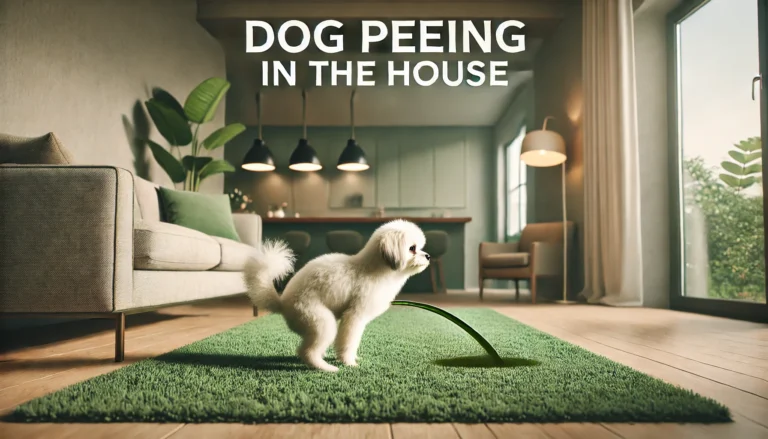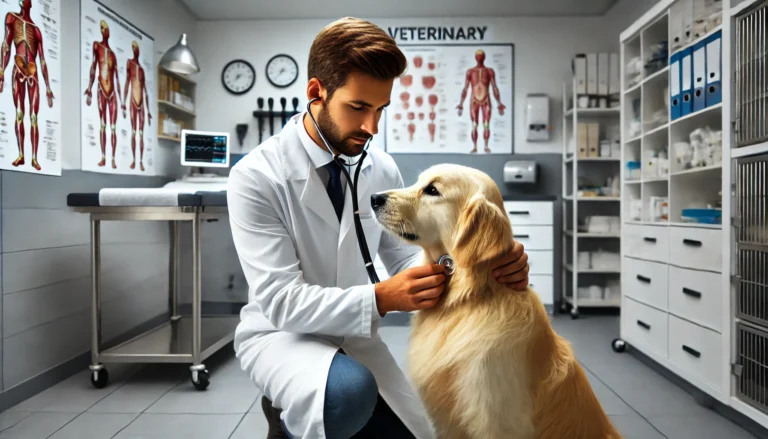why do dogs lick and chew their paws?
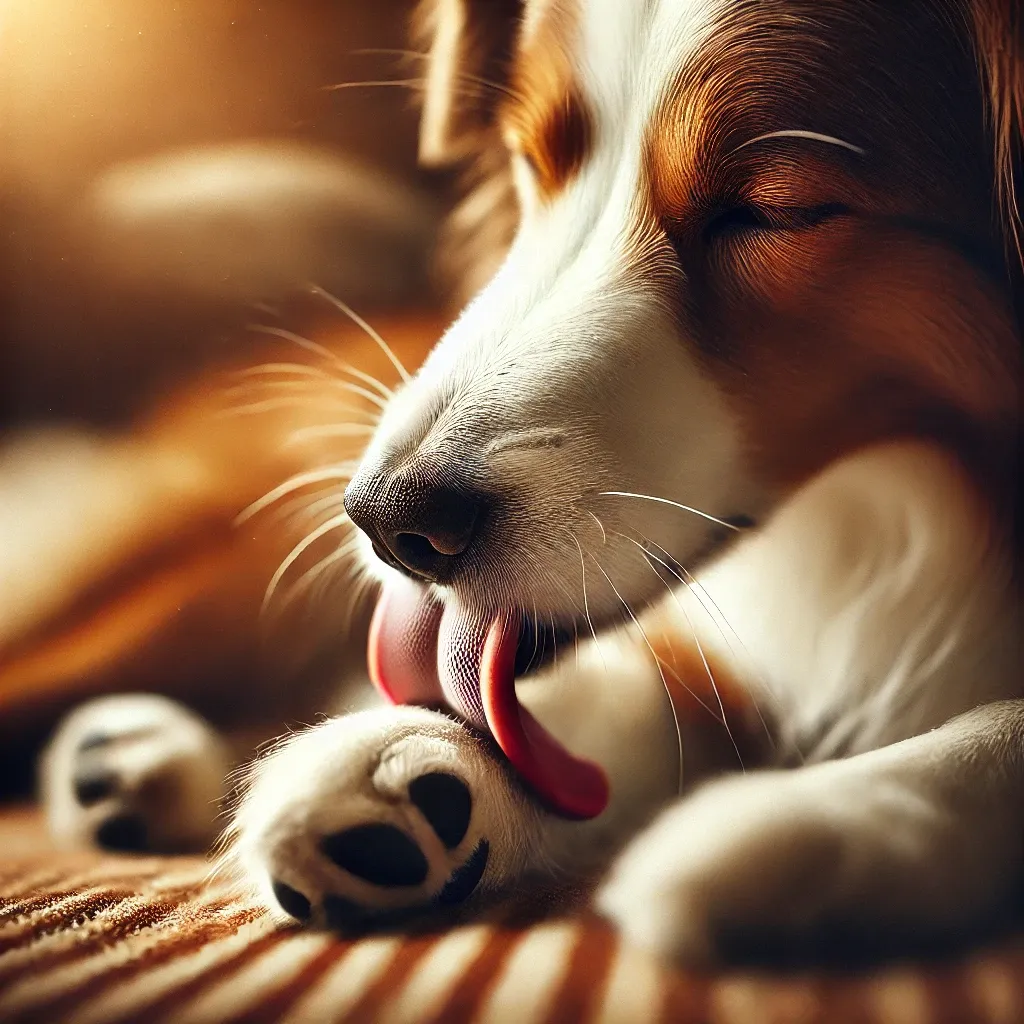
“Why do dogs lick and chew their paws?” This is the most frequently asked question from dog owners to veterinarians. Dogs are beloved companions known for their loyalty and affection, but sometimes they exhibit behaviors that can be concerning to pet owners—like incessantly licking and chewing their paws. While occasional grooming is normal, excessive paw licking can indicate underlying issues that warrant attention. Let’s explore the various reasons why dogs engage in this behavior and what you can do to help.
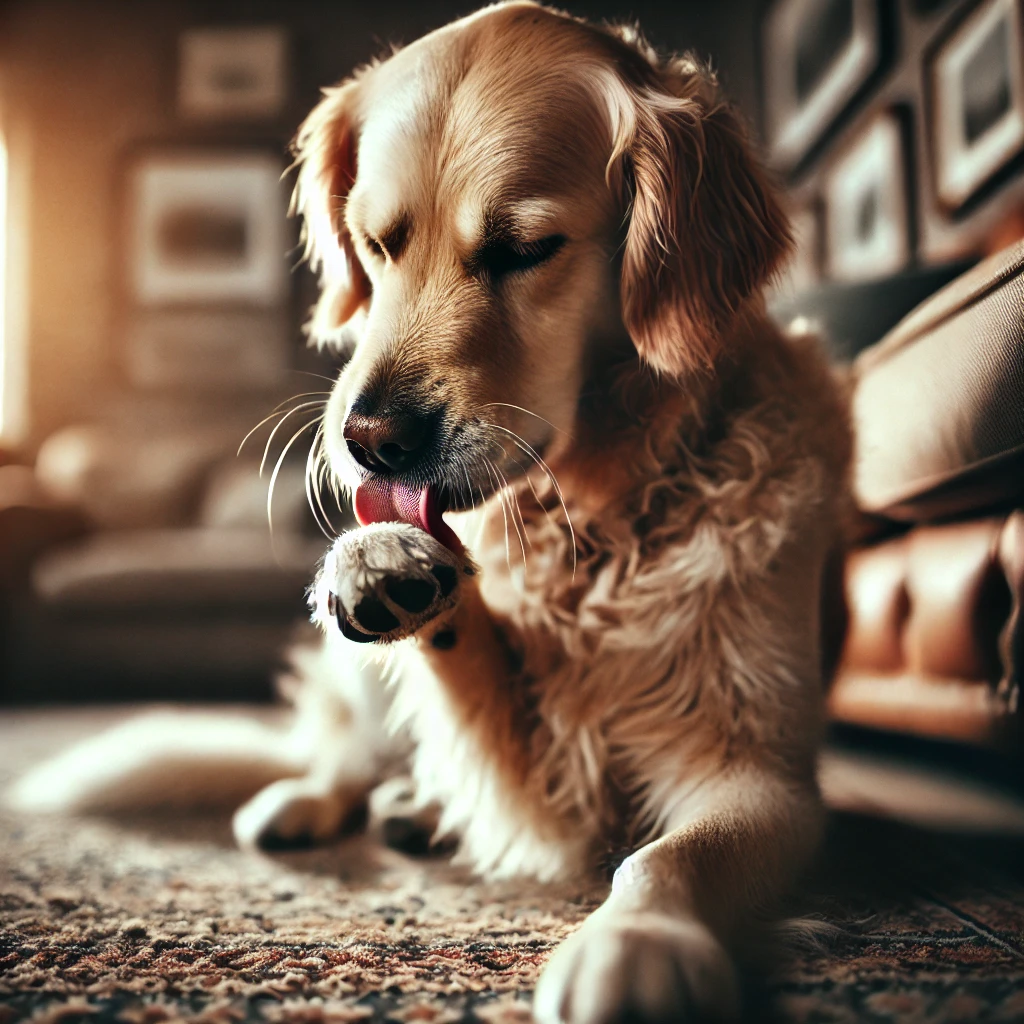
Causes: Why Do Dogs Lick and Chew Their Paws?
In order to find out the prime reasons behind why do dogs lick and chew their paws? we need to know exact reasons behind this act. Some of the causes are mentioned below:
Natural Grooming Behavior: Paw Maintenance
Licking is a natural behavior for dogs, similar to how cats groom themselves. It helps them keep their paws clean and free from dirt, debris, and potential irritants they encounter during walks or playtime. This regular grooming routine is generally harmless and serves a practical purpose in their hygiene. This is one of the main reasons behind why do dogs lick and chew their paws?
Allergies: Common Culprit Behind Paw Licking
One of the primary reasons for excessive paw licking is allergies. Dogs can be allergic to a variety of substances including pollen, dust mites, certain foods, and even materials like plastics or carpets. When exposed to allergens, dogs may develop itchy, irritated paws, prompting them to lick and chew in an attempt to soothe the discomfort. Allergies can manifest at any age and may require careful management to identify and eliminate triggers. Allergies are equally to be held responsible to why do dogs lick and chew their paws?
Skin Conditions: Irritation and Infection
In addition to allergies, skin conditions such as dermatitis, fungal infections (like yeast), or bacterial infections can cause irritation and redness on the paws. These conditions often lead to persistent licking as dogs try to alleviate the itching or pain. If you notice your dog’s paws are red, swollen, or have a foul odor, it’s crucial to seek veterinary care promptly for an accurate diagnosis and appropriate treatment. Irritation and infection are also known to be the major cause of why do dogs lick and chew their paws?
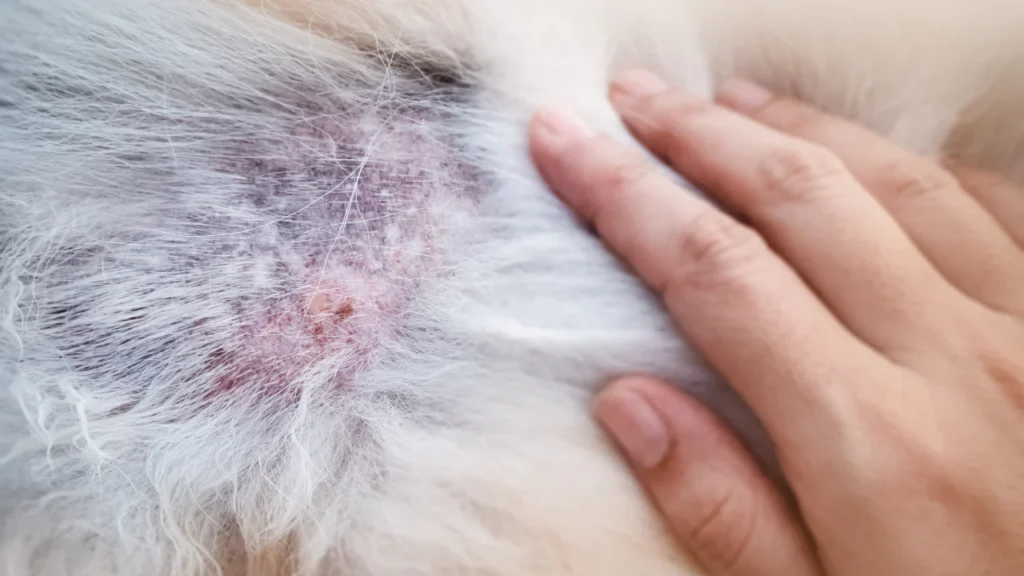
Anxiety and Stress: Psychological Factors
Dogs, like humans, can experience anxiety and stress, which may manifest in behaviors such as excessive paw licking. This behavior serves as a self-soothing mechanism for some dogs, providing temporary relief from emotional distress. Identifying and addressing the underlying stressors through environmental enrichment, behavioral training, or even calming supplements recommended by a veterinarian can help reduce paw licking associated with anxiety. Without any iota of doubt psychological factors are also known to be the reason of why do dogs lick and chew their paws?
Pain or Injury: Physical Causes
Physical causes like pain or injury are also called the main reasons as to why do dogs lick and chew their paws?Sometimes, paw licking is a response to pain or discomfort. Dogs may lick their paws if they have splinters, cuts, bruises, or foreign objects lodged in their paw pads. Conditions like arthritis or joint pain can also lead to increased licking as dogs attempt to alleviate their discomfort. Regularly inspecting your dog’s paws for signs of injury or tenderness can help detect and address these issues early.
Diseases Related to why do Dogs Lick and Chew Their Paws?
Understanding why dogs lick and chew their paws excessively is crucial for identifying potential underlying health issues or diseases that require attention and care. Here are some conditions often associated with this behavior:
Allergic Dermatitis
Allergic dermatitis is a leading cause of why dogs lick and chew their paws excessively. It occurs when dogs are allergic to environmental triggers such as pollen, dust mites, or certain materials. This allergic reaction leads to itching and irritation, prompting dogs to lick and chew their paws in an attempt to alleviate discomfort. Without intervention, allergic dermatitis can progress to secondary infections, complicating treatment.
Yeast Infections (Malassezia Dermatitis)
Yeast infections, particularly Malassezia dermatitis, can develop in the moist, warm environment between a dog’s toes. Dogs prone to allergies or those with damp paws are more susceptible. Symptoms include red, inflamed paws with a greasy or musty odor, often leading to persistent licking and chewing. Treatment involves antifungal medications prescribed by a veterinarian to eradicate the yeast and soothe the affected area.
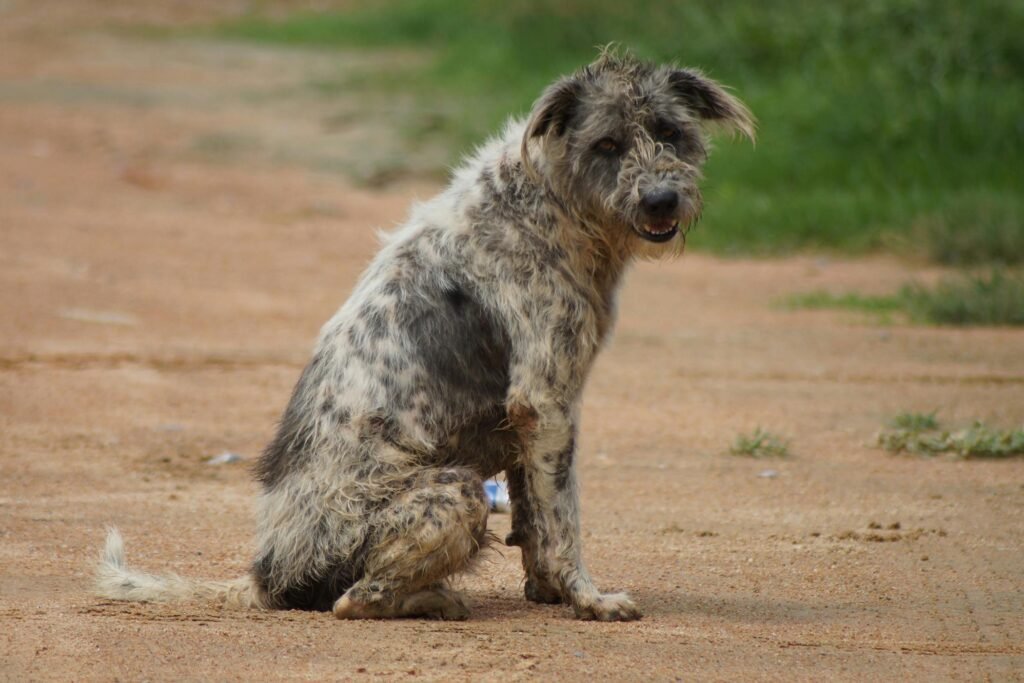
Bacterial Infections
Bacterial infections on the paws can arise from secondary issues like allergies or injuries. Dogs may lick their paws excessively as a response to the discomfort caused by these infections. Symptoms include redness, swelling, pus, and sometimes a foul odor emanating from the affected area. Antibiotics are typically necessary to treat bacterial infections effectively and prevent them from spreading.
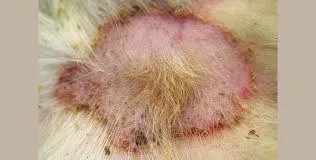
Parasitic Infestations
Parasites such as mites (e.g., Demodex or Sarcoptes) can infest a dog’s paws, causing intense itching and irritation. Dogs may chew or lick their paws excessively to alleviate the discomfort caused by these parasites. Treatment involves specific medications to eliminate the parasites and relieve symptoms, addressing the root cause of the paw licking behavior.
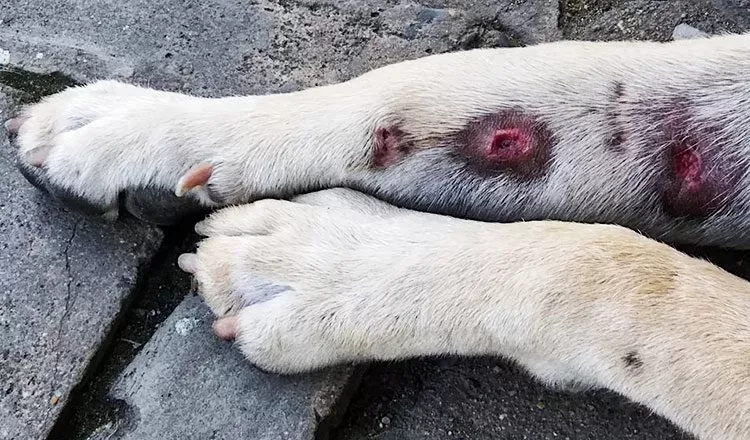
Atopy (Environmental Allergies)
Atopy refers to allergic reactions to environmental allergens such as pollen, mold, or dust mites. Dogs with atopy often experience generalized itching, which manifests as paw licking and chewing. Managing atopy involves identifying and minimizing exposure to allergens, along with medications like antihistamines or immunotherapy to control symptoms and reduce paw-related irritation.

Food Allergies
Food allergies can cause dogs to develop allergic reactions to specific ingredients in their diet, such as proteins (e.g., chicken, beef) or grains (e.g., wheat, corn). Paw licking and chewing can be signs of food allergies, alongside symptoms like gastrointestinal upset or skin irritation. Diagnosing and managing food allergies requires a strict elimination diet prescribed by a veterinarian to identify the allergen and prevent further paw-related issues.
Autoimmune Diseases
Certain autoimmune diseases, such as lupus (systemic lupus erythematosus) or pemphigus, can cause lesions or ulcers on a dog’s paw pads. Dogs may lick their paws excessively due to pain, discomfort, or the presence of open sores. Treatment involves immunosuppressive medications and supportive care to manage these complex conditions and alleviate paw-related symptoms.
Joint Pain and Arthritis
Dogs suffering from joint pain or arthritis may lick their paws as a response to discomfort and inflammation. Arthritis can affect mobility and lead to secondary paw pad injuries or irritations. Managing joint pain through medications, supplements, weight management, and physical therapy can help alleviate symptoms and reduce the need for paw-related self-soothing behaviors like licking and chewing.
Anxiety and Behavioral Issues
While not a disease itself, anxiety and stress can manifest in excessive paw licking as a coping mechanism for dogs. Dogs may lick their paws compulsively when anxious or bored, leading to skin irritation or secondary infections. Behavioral modifications, environmental enrichment, and possibly medications can help manage anxiety-related paw licking and improve overall well-being.
What Should You Do?
Veterinary Examination: Initial Assessment
If your dog is licking their paws excessively, schedule a thorough veterinary examination. A comprehensive physical examination, combined with allergy testing or skin scrapings if necessary, can help pinpoint the underlying cause of the behavior. Your vet may also inquire about your dog’s diet, living environment, and recent changes in routine to better understand potential triggers.
Allergy Management: Treatment and Prevention
Managing allergies often involves a multi-faceted approach tailored to your dog’s specific needs. This may include dietary modifications to eliminate potential allergens, using hypoallergenic grooming products, or prescribing medications such as antihistamines or corticosteroids to alleviate symptoms. Minimizing exposure to environmental allergens and maintaining regular veterinary check-ups are essential for long-term management of allergic reactions.
Paw Care: Preventive Measures
Maintaining good paw hygiene is crucial for preventing irritation and infection. Regularly clean your dog’s paws after outdoor activities to remove dirt and allergens. Trim excess hair around the paw pads to prevent matting and reduce the risk of debris accumulation. Keeping your dog’s nails trimmed and paw pads moisturized can also contribute to overall paw health and comfort.
Behavioral Modification: Addressing Stress and Anxiety
For dogs exhibiting paw licking due to stress or anxiety, creating a calm and predictable environment is essential. Provide mental stimulation through interactive toys, regular exercise, and positive reinforcement training to promote relaxation and reduce anxious behaviors. Calming aids such as pheromone diffusers or supplements containing natural ingredients like chamomile or valerian root may also help alleviate anxiety-related paw licking.
Monitoring and Patience
Addressing excessive paw licking may require patience and ongoing monitoring. Keep track of any changes in your dog’s behavior or paw condition and communicate openly with your veterinarian about progress and concerns. Adjusting treatment plans as needed and maintaining a proactive approach to your dog’s health can lead to significant improvements in paw licking behavior over time.
Conclusion
Understanding why dogs lick and chew their paws excessively is crucial for identifying and addressing potential underlying health issues or behavioral concerns. By working closely with your veterinarian to develop a personalized treatment plan, you can help your furry companion enjoy a comfortable, happy life free from discomfort and anxiety associated with paw licking. Remember, early intervention and consistent preventive care are key to promoting optimal paw health and overall well-being for your beloved pet.



